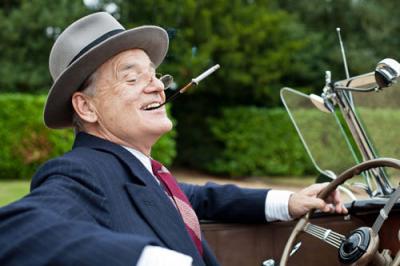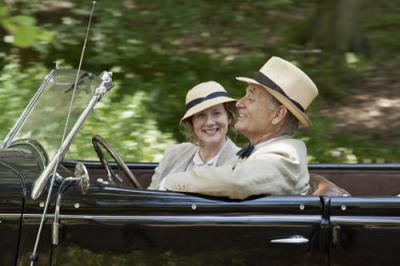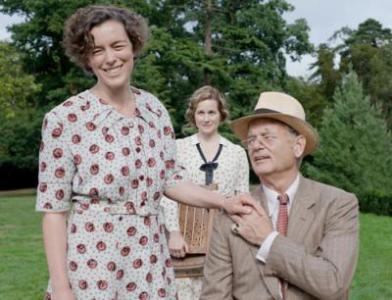By: debbie lynn elias

A fascinating slice of life and peek behind the curtain at a pivotal point in world history, HYDE PARK ON THE HUDSON takes us into the private world of Franklin Delano Roosevelt, a very public figure who actually managed to keep his personal life personal. With a tour de force performance by Bill Murray as FDR, HYDE PARK keenly focuses on a weekend in 1939 when the King and Queen of England came to visit. The purpose of their visit was to solicit help from America in the war against Nazi Germany and Hitler. Told in narrative format by FDR’s 5th cousin Daisy (with whom he may or may not have had more than a romantic dalliance with), it’s as if we are flies on the wall or a piece of furniture in the room as we look into the world of HYDE PARK and FDR through the eyes of Daisy who, while an intimate of FDR’s, felt herself merely an observer, “the little mud wren”, adding a palpable understanding to the tale as if we, too, were at the well publicized picnic eating hot dogs with the King of England.
Performance driven, this is Bill Murray’s film. A surprising choice to play FDR, Murray is spot-on, thanks not only to impeccable make-up, but in his nuance, delivery, vocal and physical cadence, and in capturing elements of humor for which FDR was known. Although many of his mannerisms and poses feel just that – posed like well known FDR photos of the day – it works wonders for establishing historical reference. Where Murray excels, however, is in his chemistry with Samuel West’s King, and particularly in intimate one-on-one scenes between the two. An afternoon meeting sequence lays the groundwork of the relationship between the men and the countries, but the after dinner talk just soars. There is free-flowing sense of truth and candor that is at its best with Murray exuding parental support and guidance and encouragement to the frightened young King. Beautifully performed. Heartfelt and poignant.
Although West does an admirable job as the young King, one can’t help but have Colin Firth’s Oscar winning performance in their mind while watching him. However, given the specific point in time of this story, West is perfectly cast as it buttresses the paternal relationship that we see between the King and FDR, showcasing the King’s youth and inexperience against this strong charismatic world leader.
Olivia Williams delivers the most “earthy” and true to life Eleanor Roosevelt than we have seen on film, but she pales with the memory of Jane Alexander’s 1976 version which made Eleanor a more formidable presence in keeping with the public image and memory of her, as well as imbuing her with more social charm and grace than we see here from Williams. Every scene in which Williams is present, has an uncomfortable tension and edge that is disjointing and distracting.
As Roosevelt’s mother Sara, Elizabeth Wilson provides almost a “third eye” or 5th or 6th or 7th, into what made FDR tick. A true “mama’s boy” and always under her thumb, FDR married Eleanor, an equally strong woman who also tried to put him under her thumb, both of which make it easy to see why the man would want other female companionship from women who weren’t always outwardly telling him what to do, but who “tended” to him the way a mother caters to a sick child. Surprising to me was that Wilson’s performance doesn’t appear anywhere near as daunting as some of the historical readings on Sara and her relationship with FDR. It seems more blustery and “old-woman fuss-budgety” more than anything.

But then there’s Laura Linney. Mousey, hesitant, tentative, she gives Daisy the demeanor of a 1930’s 15 year old with her first crush; sitting at the adult table for the first time but not knowing whether to put the napkin on her lap or under her chin or which fork to use, and still operating under the theory of “children should be seen and not heard.” It’s a very conflicted performance in the design of the character and I am still unsure if I like it. On one hand, in her scenes alone with Murray there are times we see a freshness and wide-eyed wonder of a child seeing the world for the first time, falling in love with this older man in both a paternal and romanticized way. Interesting and poignantly sweet at the same time. I do like the film being told from Daisy’s POV and Linney’s narrative with her vocal inflection and accent adds interest, but objective interest as if reporting the news with no bias one way or the other.
Written by Richard Nelson, HYDE PARK ON THE HUDSON, is based on the writings of Daisy Suckley herself. Found in a small suitcase under her bed at the time of her death, intimate letters between Daisy and Franklin Roosevelt, as well as personal diairies, document not only what up until this discovery had been secret, but the depth of emotion shared by the couple. Although there were pages missing from the letters and the diaries, what remained was the portrait of a love story, a love story that is now rekindled for the world to see. The detail which Nelson and director Roger Michell infuse into both the dialogue and the visual apportionments is astounding and very telling of the world behind the facade of the presidency, humanizing both politics and its players.
A notable permeating trend within the film is the distinguishability between scenes and character traits or personas. Where Murray as FDR is 1:1 with one other person, i.e., Murray and West, Murray and Daisy or Murray alone in a moment of thought, all are emotionally larger than life, poignant, reflective and telling. But get more than Murray and one other person in the scene and there is discomfort and tension. Perhaps this is a design by director Roger Michell to create an emotional “elephant in the room” similar to FDR’s braces and wheelchair, but it doesn’t feel metaphoric. It feels like a game of “which of things is not like the other” which all but Murray and one other belonging in the scene, but no one had the guts to remove the things that didn’t belong.

Also telling is the dynamic between the King and Queen, Bertie and Elizabeth, which is showcased with both propriety and a personal touch through story structure and the performances of West and Olivia Colman, shedding light not only on the monarchs but on England’s still tentative and wary relationship with the United States some 170 years after the Revolutionary war.
Sweepingly romanticized and soft is Lol Crowley’s cinematography which gives the illusion of lensing through a cheesecloth/10 denier nylon , providing HYDE PARK with a definitive look and feel of weathered history through rose-colored glasses as if looking at the faded stamps in FDR’s stamp books – still vibrant and telling of life and a time, but a little worn around the edges and softened with the passage of time and memory. Truly lovely imagery. Disappointing however, is that director Michell never allows the camera to linger over the exquisitely apportioned production design of Simon Bowles, thus losing opportunity for real immersion in time and space.
HYDE PARK ON THE HUDSON looks back on one weekend in history with the warmth and poignancy of an old family album; dusting off the pictures one more time, giving us a new and human look at one man who helped changed history.
Directed by Roger Michell.
Written by Richard Nelson.
Cast: Bill Murray, Laura Linney, Simon West, Olivia Williams, Elizabeth Wilson, Olivia Colman












